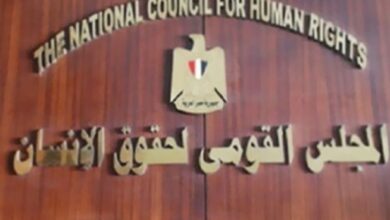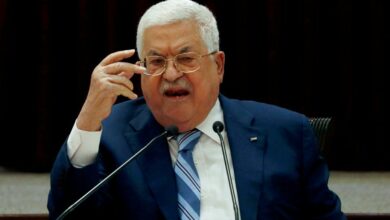Thousands of activists from groups and political parties that supported the Egyptian revolution gathered in Cairo on Saturday for a conference aimed at coordinating efforts to protect the gains of the revolution and ensure a transition to full democracy.
The conference, titled the “First Conference of Egypt: Towards Protecting the Revolution”, was intended to bring revolutionary groups together and generate dialogue on key issues, including changes to the constitution, the banning of former members of the National Democratic Party (NDP) from participating in government, preparations for upcoming elections and the state of the economy.
“I consider this conference a miniature Tahrir Square,” said Hussein Abdel Ghani, the master of ceremonies and one of the organizers of the event.
The conference was organized by the National Council, a body created by noted activist Mamdouh Hamza with the aim of ensuring a smooth transition to democracy. One of the key ideas behind the body is that it should ultimately be responsible for the formation of a committee empowered to draft a new constitution.
Among the proposals put foward by the National Council is that a new constitution should be written and put in place before the coming parliamentary elections, a move that would conflict with some of the main articles voted on during the 19 March referendum.
Invitations to the conference were sent out to all major organisations and political parties who supported the revolution, and most responded positively.
Among the major names in attendence were presidential candidates Ayman Nour, Hisham al-Bastawisy, and Hamdeen Sabahy, although they did not address the conference. Mohamed ElBaradie, however, did not attend.
The key parties and groups involved included the Mohamed ElBaradei's National Association for Change, the 6th of April Youth Movement, the 25 January Revolution Youth Movement, and the Tagammu, Ghad and Karama parties.
However, the Muslim Brotherhood, widely considered Egypt’s best-organized opposition movement, did not officially participate in the event, although group members attended unofficially. The absence of the group prevented the conference from achieving its stated aim of bringing together all of the major groups that participated in the revolution.
Throughout the day, speakers discussed the formation of the National Council, constitutional, economic and electoral matters. Experts presented papers and young activists presented their aspirations and demands.
But the major gain from the event was the revival of the sense of unity felt during the first 18 days in Tahrir Square, one that is considered essential for the success of pro-revolutionary and pro-democracy forces in the run up to parliamentary elections.
“The continuation of the revolution is the only guarantee of its success,” said Hossam Issa, a law professor at Ain Shams University.
Many of those attending expressed the view that the revolution needs to be protected from anti-revolutionary forces.
“The groups present created the revolution, and these groups are the ones that must preserve it,” said Nasser Abdel Hamid, a member of the 25 January Revolution Youth Coalition.
Many stressed the importance of continuing the purge of key elements responsible for political corruption before beginning the task of rebuilding.
Amr Hashem Rabie made one of the more unanimously agreed upon points of the day: that former NDP members and “those who participated in corrupting political life in Egypt” should be banned from government for a certain period of time. For corrupt elements to have been able to operate so brazenly, the mechanisms for accountability must have also been corrupt, many argued, and should therefore be recalibrated as well.
Revolutionary forces have in general been upset with the exclusive and secretive manner in which the Supreme Council of the Armed Forces (SCAF) has been governing the country since assuming power on 11 February, making many decisions without proper consultation with political forces.
But the main focus of discussion at the conference was the issue of Egypt's future constitution, with many stating that the country should have a new constitution before the end of 2011. The nature of such a constitution would be the kay measure of the success or otherwise of the revolution, they said.
Legal experts and activists made various statements on the preferred content of the future consitution. Supreme Court member Tahany al-Gebaly expressed her desire for a civilian constitution that protects human rights. Such principles, she said, should be considered “supra-constitutional” precepts that can never be amended.
The old constitution gave the presidency sweeping powers and left the door open for the security forces to control the country with an iron grip through the provision for Emergency Law. It also lacked provisions for internal accountability and guarantees for an open political process.
“We didn’t have a way to hold [the executive branch] accountable… and the new constitution needs to have provisions that will allow for it to be internally overturned,” Gebaly said.
Conference delegates also spent considerable time debating the country's economic situation.
When Mubarak came to power, Egypt had domestic debts of around LE4 billion. At the time of his ouster 30 years later, the internal debt is a staggering LE888 billion.
According to AbdelKhalek Farouk, an economic expert at the Ahram Center for Political and Strategic Studies, Egypt does not need aid to be able to close the debt gap. “Short-term policies that can help eliminate the debt include eliminating the special dispensation boxes, re-evaluating all our international gas deals, and revamping our entire budget structure,” said Farouk.
Participants in the conference said they would refuse future offers of aid to Egypt from the United States. Most analysts and activists present said they believe in Egypt’s ability to cope.
The event highlighted the ability of revolutionary forces to mobilize in large numbers for a commone cause. Around 5,000 delegates participated, double the amount originally projected.
However, true unity seems still to be a long way off. Speakers were repeatedly interrupted by non-sequiturs and chants on un-relate
Thousands of activists on Saturday gathered in Cairo for a conference aimed at coordinating efforts to protect the revolution’s gains and ensure a transition to full democracy.
The conference, titled the “First Conference of Egypt: Towards Protecting the Revolution,” was intended to unite revolutionary groups and generate dialogue on key issues, including changes to the constitution, the banning of former members of the National Democratic Party (NDP) from participating in government, preparations for upcoming elections and the state of the economy.
“I consider this conference a miniature Tahrir Square,” said Hussein Abdel Ghani, the master of ceremonies and one of event’s organizers.
The conference was organized by the National Council, a body created by noted activist Mamdouh Hamza with the aim of ensuring a smooth transition to democracy. One of the key ideas behind the body is that it should ultimately be responsible for the formation of a committee empowered to draft a new constitution.
Among the proposals put forward by the National Council is that a new constitution should be written and put in place before coming parliamentary elections, a move that would conflict with some of the main articles that were voted on during the 19 March referendum.
Invitations to the conference were sent out to all major organizations and political parties who supported the revolution, and most responded positively.
Among the major names in attendance were presidential candidates Ayman Nour, Hisham al-Bastawisy, and Hamdeen Sabahy, although they did not address the conference. Mohamed ElBaradei, however, did not attend.
Participating groups included the Mohamed ElBaradei's National Association for Change, the 6th of April Youth Movement, the 25 January Revolution Youth Movement, and the Tagammu, Ghad and Karama parties.
However, the Muslim Brotherhood, widely considered Egypt’s best-organized opposition movement, did not officially participate in the event, although members of the group attended unofficially. The group’s official absence prevented the conference from achieving its stated aim of bringing together all major groups that participated in the revolution.
Throughout the day, speakers discussed the formation of the National Council, along with constitutional, economic and electoral matters. Experts presented papers and young activists presented their aspirations and demands.
But the event’s major achievement was reviving a sense of unity felt during the 18-day revolution in Tahrir Square, a unity that is considered essential for the success of pro-revolutionary and pro-democracy forces in the run up to parliamentary elections.
“The revolution’s continuation is the only guarantee of its success,” said Hossam Issa, a law professor at Ain Shams University.
Many attending expressed the view that the revolution needs to be protected from anti-revolutionary forces.
“The groups present created the revolution, and these groups are the ones that must preserve it,” said Nasser Abdel Hamid, a member of the 25 January Revolution Youth Coalition.
Many stressed the importance of continuing to purge elements responsible for political corruption before beginning the task of rebuilding.
Amr Hashem Rabie said that former NDP members and “those who participated in corrupting political life in Egypt” should be banned from government for a certain period of time, and his words met widespread approval. For corrupt individuals to have been able to operate so brazenly, the mechanisms for accountability must have also have been corrupted, many argued, and should therefore be recalibrated as well.
In general, revolutionary forces have been upset with the exclusive and secretive manner in which the Supreme Council of the Armed Forces (SCAF) has governed the country since assuming power on 11 February. They accuse it of making many decisions without proper consultation from outside groups.
But the main focus of discussion at the conference was the issue of Egypt's future constitution, which many state that the country should have before the end of 2011. The nature of such a constitution would be the key measure of the revolution’s success, participants said.
Legal experts and activists made statements on the future constitution. Supreme Court member Tahany al-Gebaly expressed her desire for a civilian constitution that protects human rights. Such principles, she said, should be considered “supra-constitutional” precepts that could never be amended.
The old constitution gave the presidency sweeping powers and left the door open for the security forces to control the country with an iron grip by means of the Emergency Law. It also lacked provisions for internal accountability and guarantees for an open political process.
“We didn’t have a way to hold [the executive branch] accountable… and the new constitution needs to have provisions that would allow for it to be internally overturned,” Gebaly said.
Conference delegates also spent considerable time debating the country's economic situation.
When Mubarak came to power, Egypt had domestic debts of around LE4 billion. At the time of his ouster 30 years later, the internal debt is a staggering LE888 billion.
According to Abdel Khalek Farouk, an economic expert at the Ahram Center for Political and Strategic Studies, Egypt does not require aid to decrease the deficit. “Short-term policies that can help eliminate the debt include eliminating the special dispensation boxes, re-evaluating all our international gas deals, and revamping our entire budget structure,” said Farouk.
Participants in the conference said they would refuse the United States’ future offers of aid to Egypt. Most analysts and activists present said they believe in Egypt’s ability to cope without US financial support.
The event highlighted the ability of revolutionary forces to mobilize for a common cause. Around 5000 delegates participated, double the amount originally projected.
However, true unity still appears a long way off. Speakers were repeatedly interrupted by non-sequiturs and chants on unrelated topics. Many attendees, meanwhile, claimed that the conference did not give representatives from outside Cairo enough time to fully represent their constituents. At one point, the stage was briefly overtaken by grumpy participants.
A second conference is set to be held in the Nuba region, although the date has yet to be announced.
Many attendees, meanwhile, claimed that the conference did not give the youth and members from outside Cairo enough time to fully represent their constituents. At one point, the stage was briefly overtaken by grumpy participants.
A second conference is set to be held in the Nuba region, although the date is yet to be announced.


